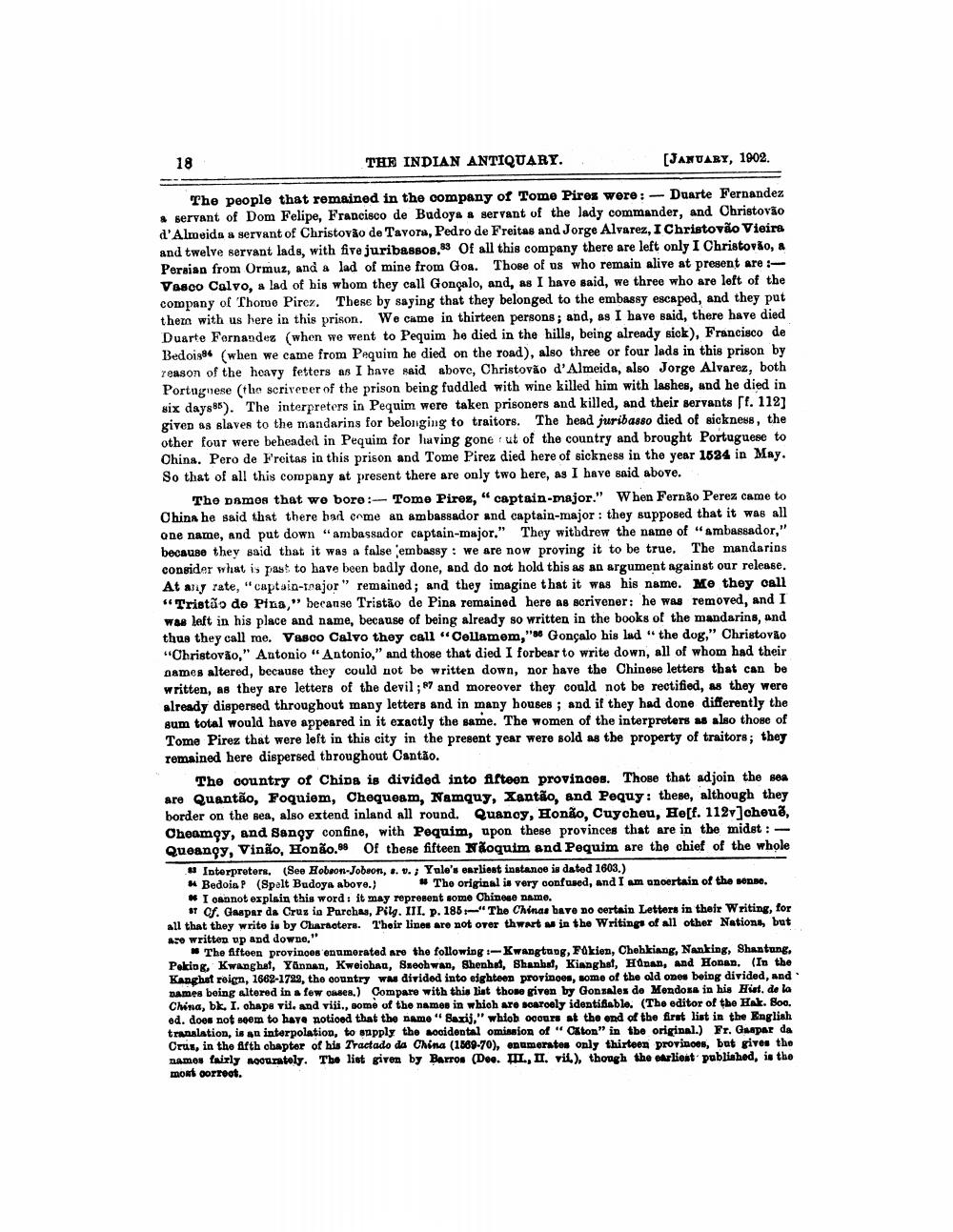________________
18
THE INDIAN ANTIQUARY.
(JANUARY, 1902.
The people that remained in the company of Tome Pires were :-Duarte Fernandez * servant of Dom Felipe, Francisco de Budoya a servant of the lady commander, and Christovão d'Almeida a servant of Christovão de Tavora, Pedro de Freitas and Jorge Alvarez, I Christovão Vieira and twelve servant lads, with five juribassos.89 Of all this company there are left only I Christovão, a Persian from Ormuz, and a lad of mine from Goa. Those of us who remain alive at present are:Vasco Calvo, a lad of his whom they call Gonçalo, and, as I have said, we three who are left of the company of Thome Pirez. These by saying that they belonged to the embassy escaped, and they put them with us here in this prison. We came in thirteen persons; and, as I have said, there have died Duarte Fernandez (when we went to Pequim he died in the hills, being already sick), Francisco de Bedoig86 (when we came from Pequim he died on the road), also three or four lads in this prison by reason of the heavy fetters as I have said above, Christovão d'Almeida, also Jorge Alvarez, both Portuguese (the scriverer of the prison being fuddled with wine killed him with lashes, and he died in six days 85). The interpreters in Pequim were taken prisoners and killed, and their servants st. 112] given as slaves to the mandarins for belonging to traitors. The head juribasso died of sickness, the other four were beheaded in Pequim for having gone ut of the country and brought Portuguese to China. Pero de Freitas in this prison and Tome Pirez died here of sickness in the year 1624 in May. So that of all this company at present there are only two here, as I have said above.
The damos that wo bore:- Tomo Pires,"captain-major." When Fernão Perez came to Ohina he said that there has come an ambassador and captain-major: they supposed that it was all one name, and put down "ambassador captain-major." They withdrew the name of "ambassador," because they said that it was a false embassy : we are now proving it to be true. The mandarins consider what is pass to have been badly done, and do not hold this as an argument against our release. At any rate, "captain-tajor" remained; and they imagine that it was his name. Me they call “Tristão de Pira," becanse Tristão de Pina remained here as scrivener: he was removed, and I was left in his place and name, because of being already so written in the books of the mandarins, and thua they call me. Vasco Calvo they call “Cellamem," Gonçalo his lad "the dog," Christovão "Christovão," Antonio "Antonio," and those that died I forbear to write down, all of whom had their names altered, because they could not be written down, nor have the Chinese letters that can be written, as they are letters of the devil; $7 and moreover they could not be rectified, as they were already dispersed throughout many letters and in many houses ; and if they had done differently the eum total would have appeared in it exactly the same. The women of the interpreters as also those of Tome Pirez that were left in this city in the present year were sold as the property of traitors; they remained here dispersed throughout Cantão.
The country of China is divided into fifteen provinces. Those that adjoin the sea are Quantão, Foquiem, Chequeam, Namquy, Xantão, and Pequy: these, although they border on the sea, also extend inland all round. Quanoy, Honzo, Cuycheu, He[f. 112Y]cheus, Cheamcy, and Sangy confine, with Pequim, upon these provinces that are in the midst :Queangy, Vinão, Honão. Of these fifteen Nãoquim and Pequim are the chief of the whole
# Interpreters. (See Hobson-Jobeon, . v. ; Yule's earliest instance is dated 1603.) * Bedoia P (Spolt Budoya above.
The original is very confused, and I am anoertain of the sense. WIoannot explain this word: it may represent some Chinese name.
H . Gaspar da Crus in Parchas, Pilg. III. p. 185:"The China bave no certain Letters in their Writine. for all that they write is by Characters. Their lines are not over thwart in the Writings of all other Nations, but Ase written up and downe." The fifteen provinces enumerated are the following :-Kwangtung, Fákien, Chehkiang, Nanking, Shantung,
1. Yunnan, Kweichaa, neobwan, Shenhal, Shanbal, Kianghel, Hopan, and Hoben. (In the Kanghat reign, 1662-1722, the country was divided into eighteen provinces, some of the old ones being divided, and names being altered in a few cases.) Compare with this list thone given by Gonzales de Mondose in his Hist, de la China, bk, I. ohape vil. and viii., some of the names in which are soarely identifiablo. (The editor of the Hak. Boo. od. does not seem to have noticed that the name "Bazij," whiob Ooours at the end of the first list in the English translation, is an interpolation, to supply the accidental omission of "Caton" in the original.) Fr. Guapar da Crus, in the Afth chapter of his Tractado da China (1589-70), enumerates only thirteen provinces, bat gives the names fairly agourately. The list given by Barros (Dec. m., II. vil.), though the earliest published, is the most correct.




